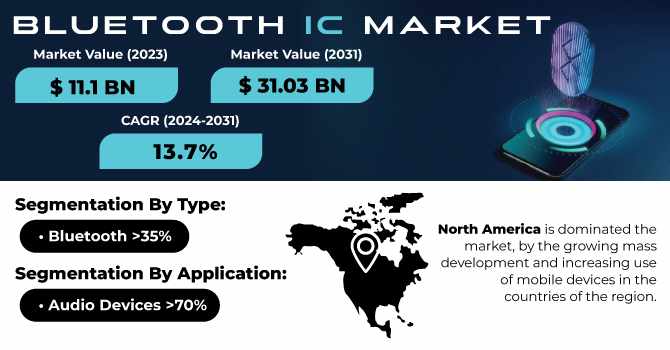
Bluetooth integrated circuits (ICs) are essential components in modern wireless communication, enabling seamless connectivity between devices over short distances. These ICs facilitate the transmission of data and audio between devices such as smartphones, tablets, wearables, and smart home appliances, revolutionizing the way we interact with technology. The versatility of Bluetooth ICs has led to their widespread adoption across various industries, including consumer electronics, automotive, healthcare, and industrial automation. As the demand for wireless solutions continues to rise, Bluetooth ICs play a pivotal role in enhancing user experience and promoting interoperability among diverse devices.
The Bluetooth IC Market size was valued at USD 11.1 Billion in 2023 and is expected to reach USD 31.03 Billion by 2031 with a growing CAGR of 13.7 % over the forecast period 2024-2031.
Future Scope
The future of Bluetooth ICs is bright, characterized by ongoing advancements in wireless technology and the growing need for efficient connectivity solutions. The introduction of Bluetooth 5.0 and subsequent versions has significantly improved data transfer speeds, range, and energy efficiency, making Bluetooth an even more attractive option for device manufacturers. Future developments are likely to focus on enhancing security features, increasing compatibility with emerging technologies such as IoT and smart home systems, and supporting higher data throughput for applications requiring real-time communication. As industries increasingly embrace wireless connectivity, Bluetooth ICs will remain central to the evolution of smart devices and ecosystems.
Trends
Current trends in the Bluetooth IC market highlight a surge in demand for low-energy Bluetooth solutions, particularly in wearables and IoT applications. The ability to maintain connectivity while consuming minimal power is crucial for battery-operated devices, driving manufacturers to develop energy-efficient Bluetooth ICs. Additionally, the rise of mesh networking capabilities is transforming how devices communicate with each other, enabling enhanced connectivity in smart home and industrial environments. The integration of voice control and artificial intelligence in Bluetooth devices is also becoming prevalent, allowing users to interact with their devices more intuitively.
Applications
Bluetooth ICs are widely used in various applications, including consumer electronics, healthcare, automotive, and industrial automation. In consumer electronics, Bluetooth ICs enable wireless audio streaming, hands-free calling, and data transfer between devices. In healthcare, Bluetooth-enabled devices facilitate remote patient monitoring and data sharing between medical equipment and smartphones, improving patient care. The automotive industry employs Bluetooth ICs for hands-free communication and infotainment systems, enhancing driver safety and convenience. In industrial automation, Bluetooth technology is increasingly utilized for connecting sensors and devices, streamlining operations and data collection.
Key Points
· Bluetooth ICs enable seamless wireless connectivity between devices.
· Future advancements will enhance data throughput, range, and security features.
· Low-energy Bluetooth solutions are gaining popularity in wearables and IoT applications.
· Applications span consumer electronics, healthcare, automotive, and industrial automation.
· The rise of mesh networking and AI integration is transforming Bluetooth device capabilities.
Read More Details: https://www.snsinsider.com/reports/bluetooth-ic-market-2742
Contact Us:
Akash Anand — Head of Business Development & Strategy
Email: info@snsinsider.com
Phone: +1–415–230–0044 (US) | +91–7798602273 (IND)











Write a comment ...